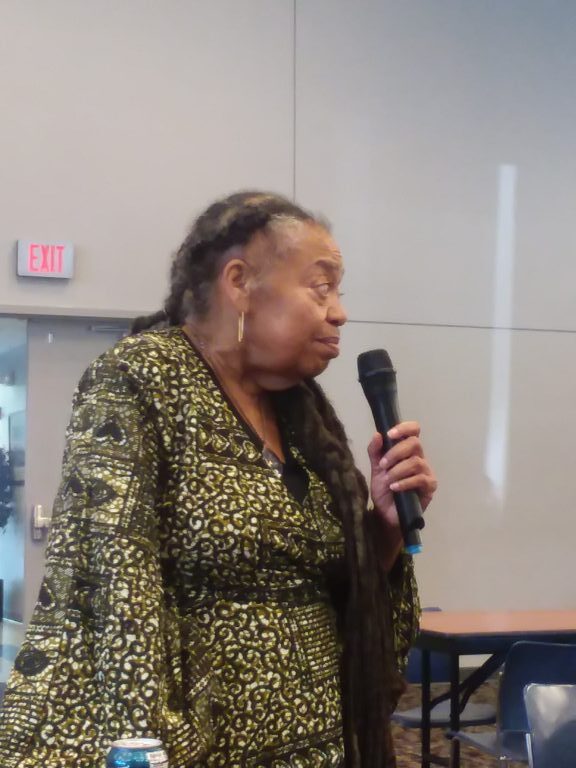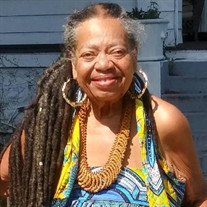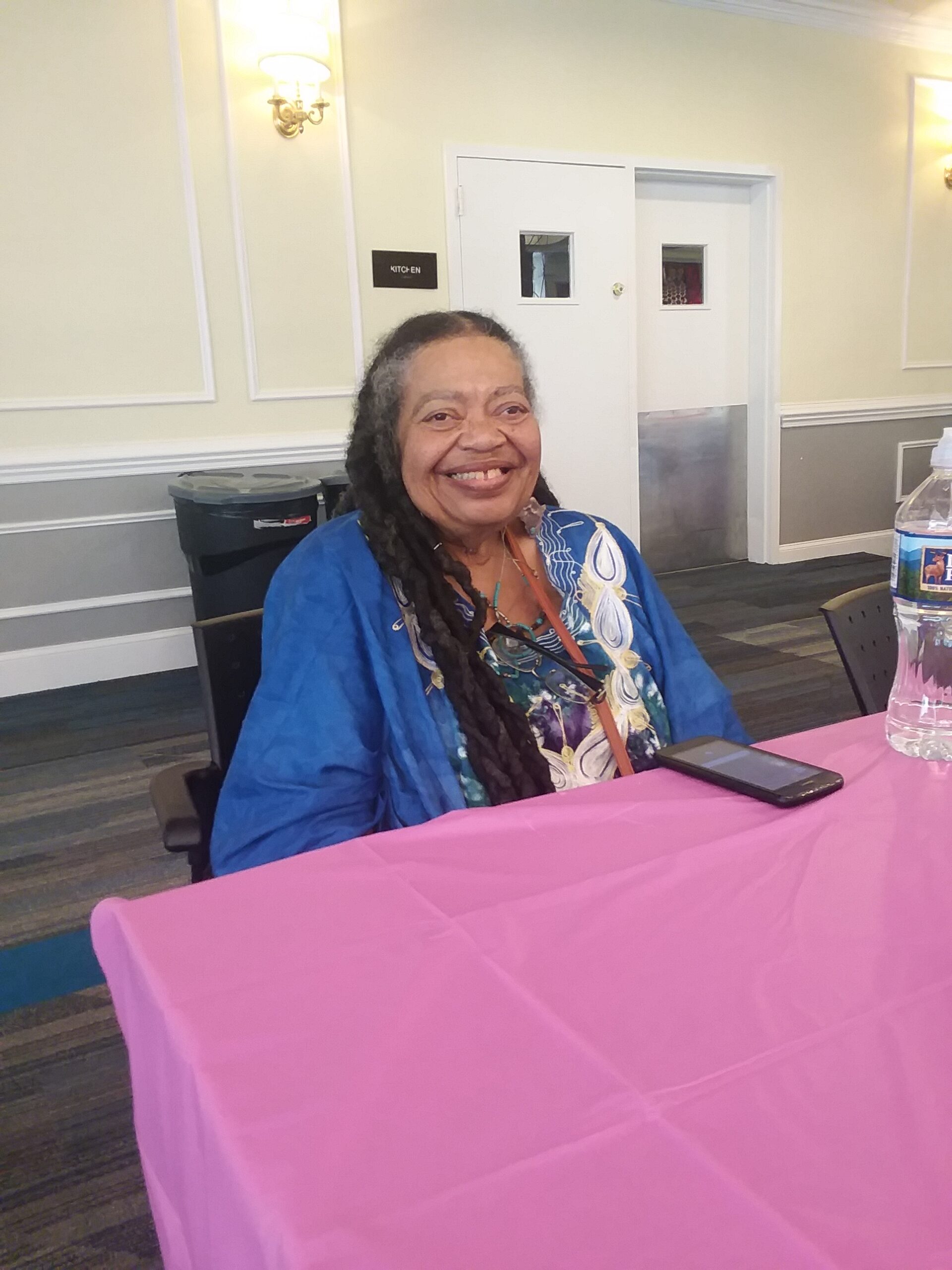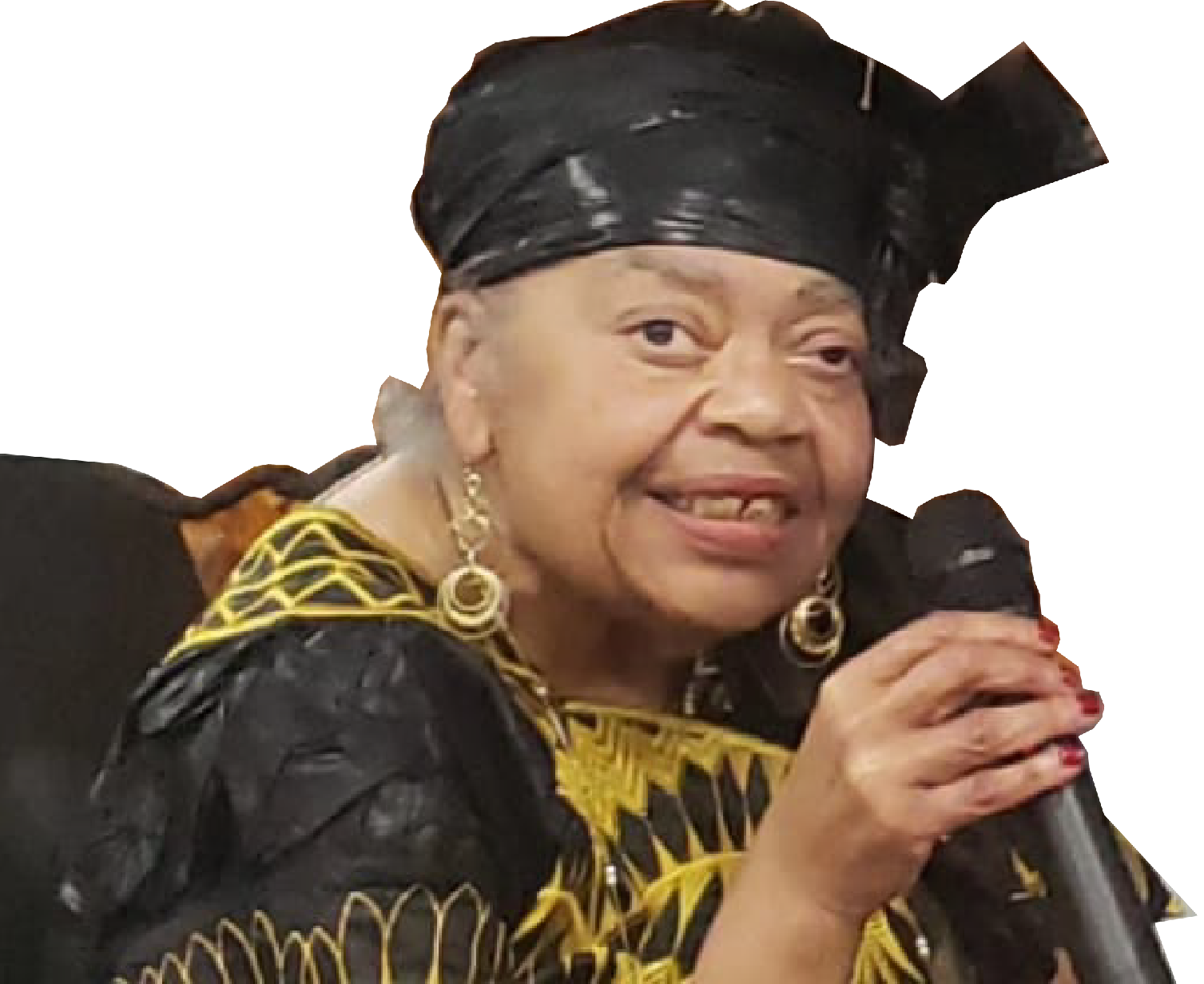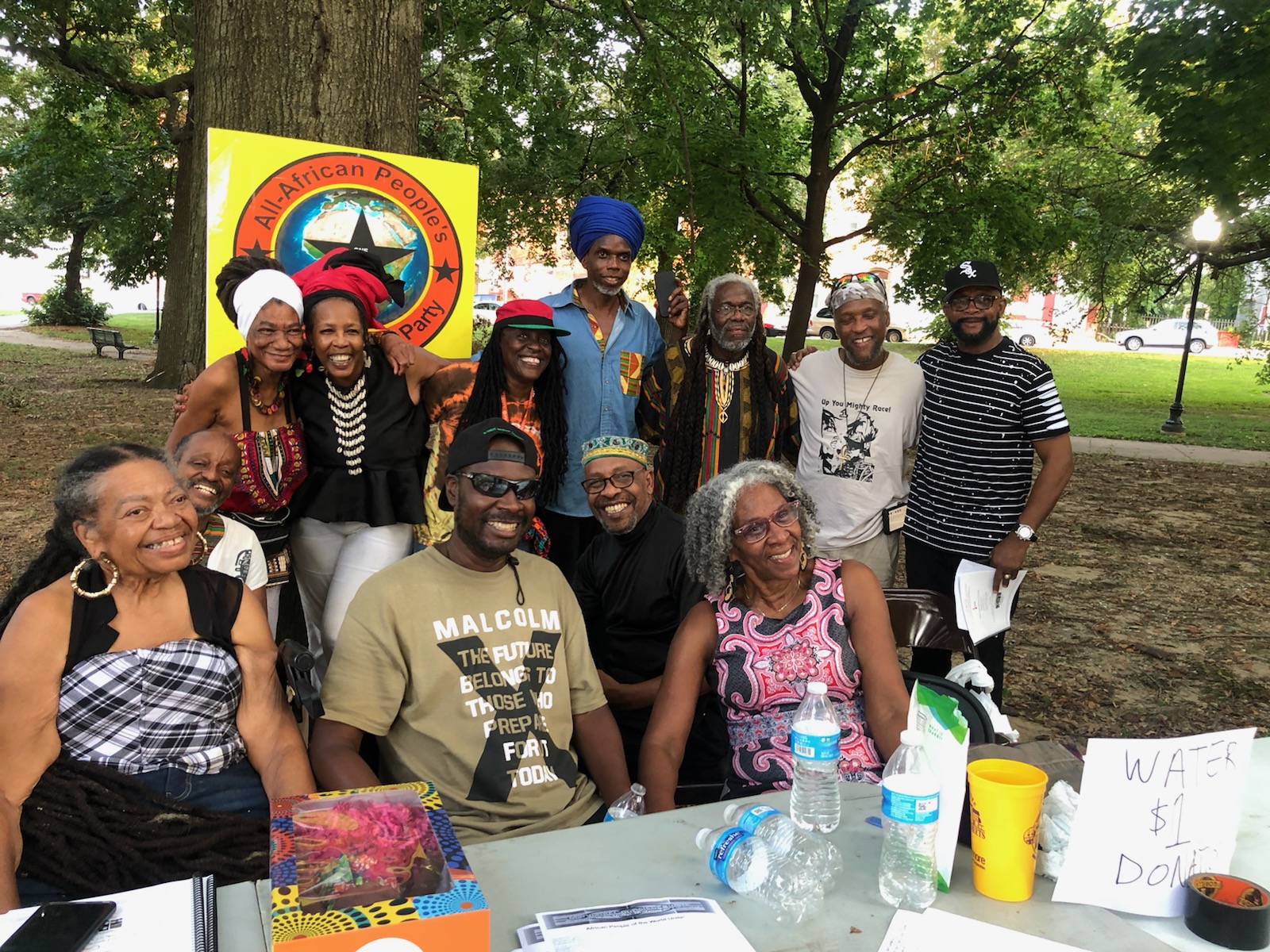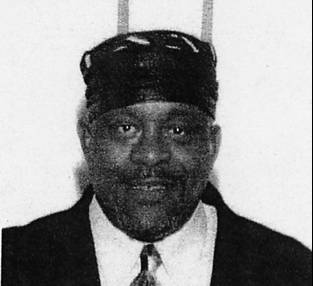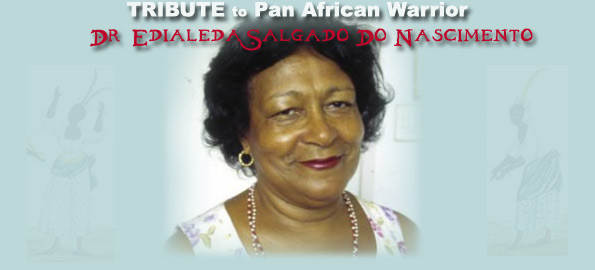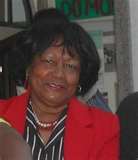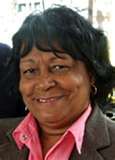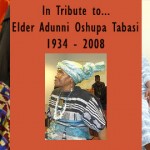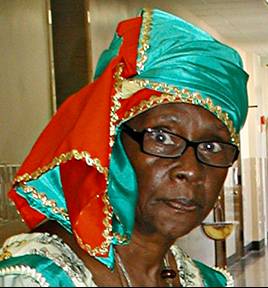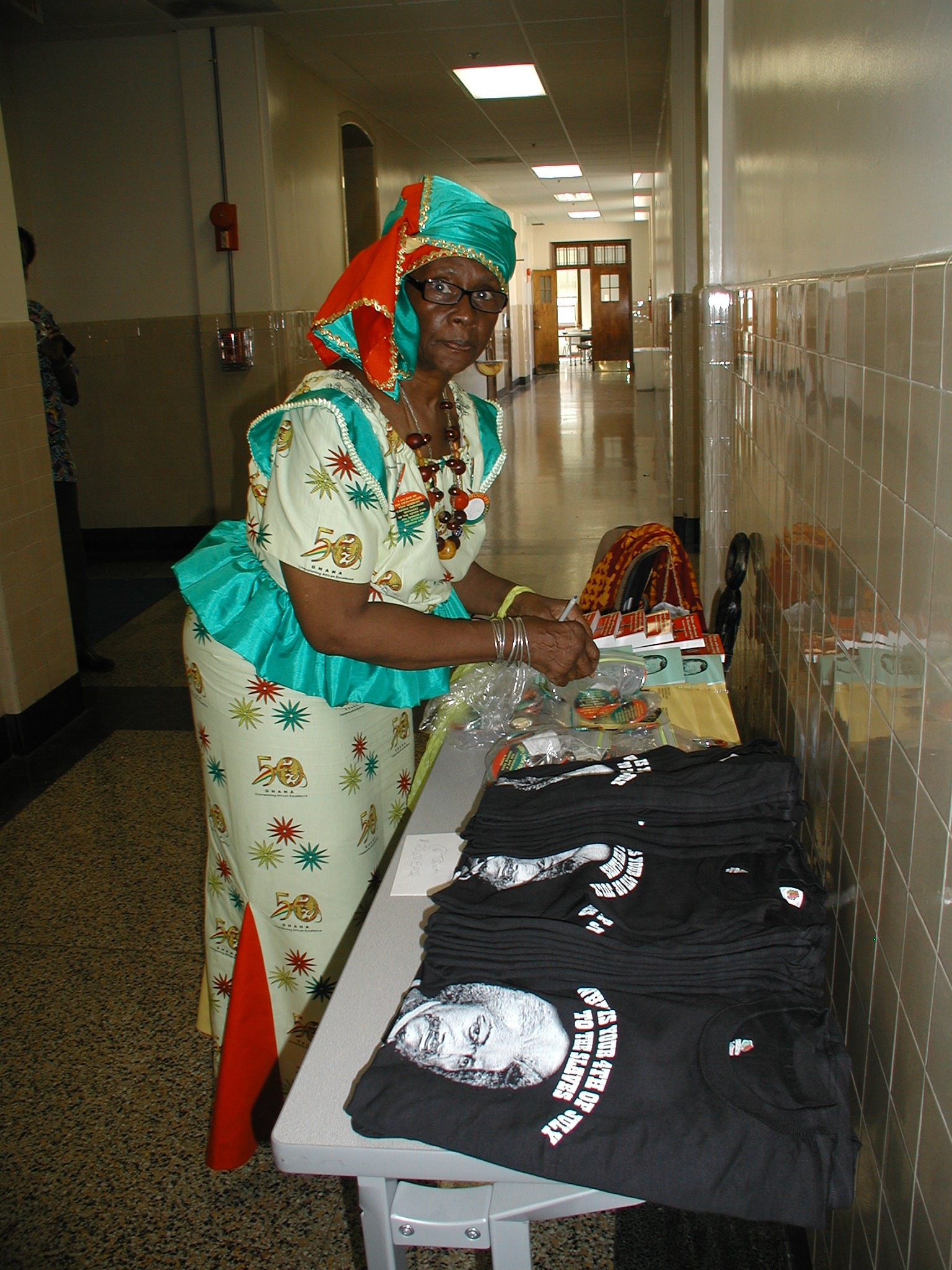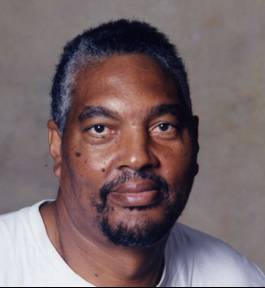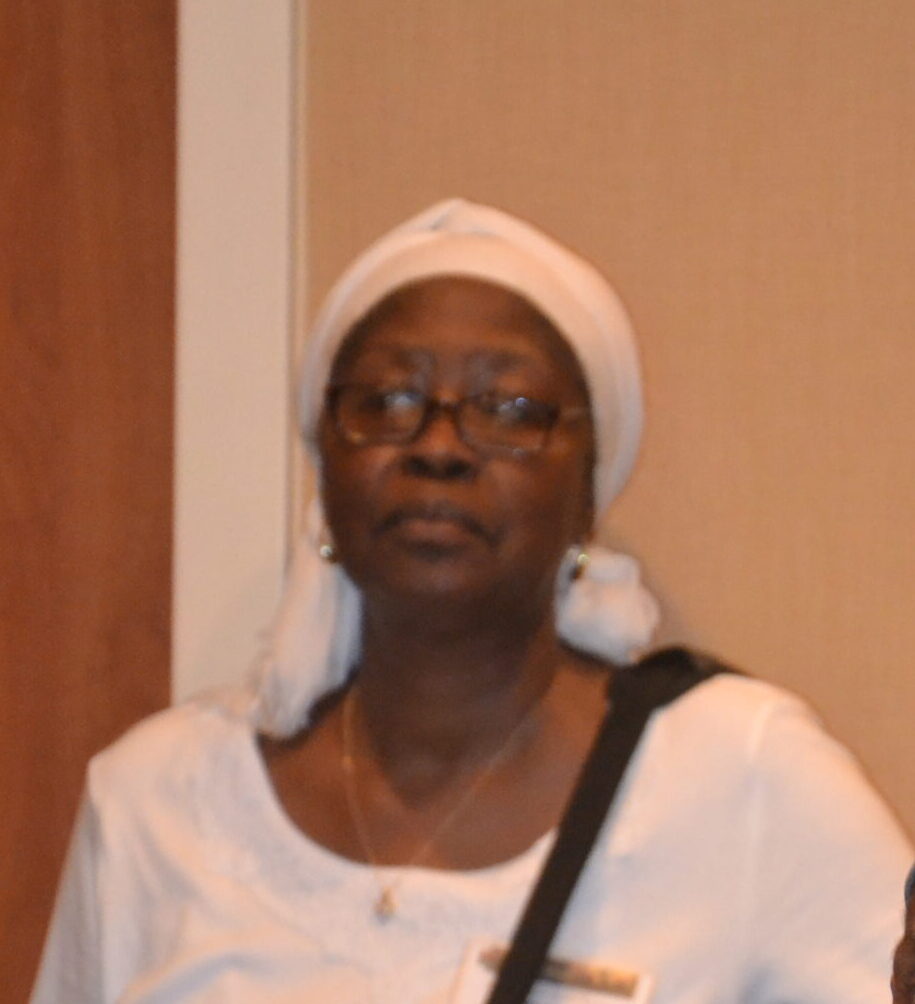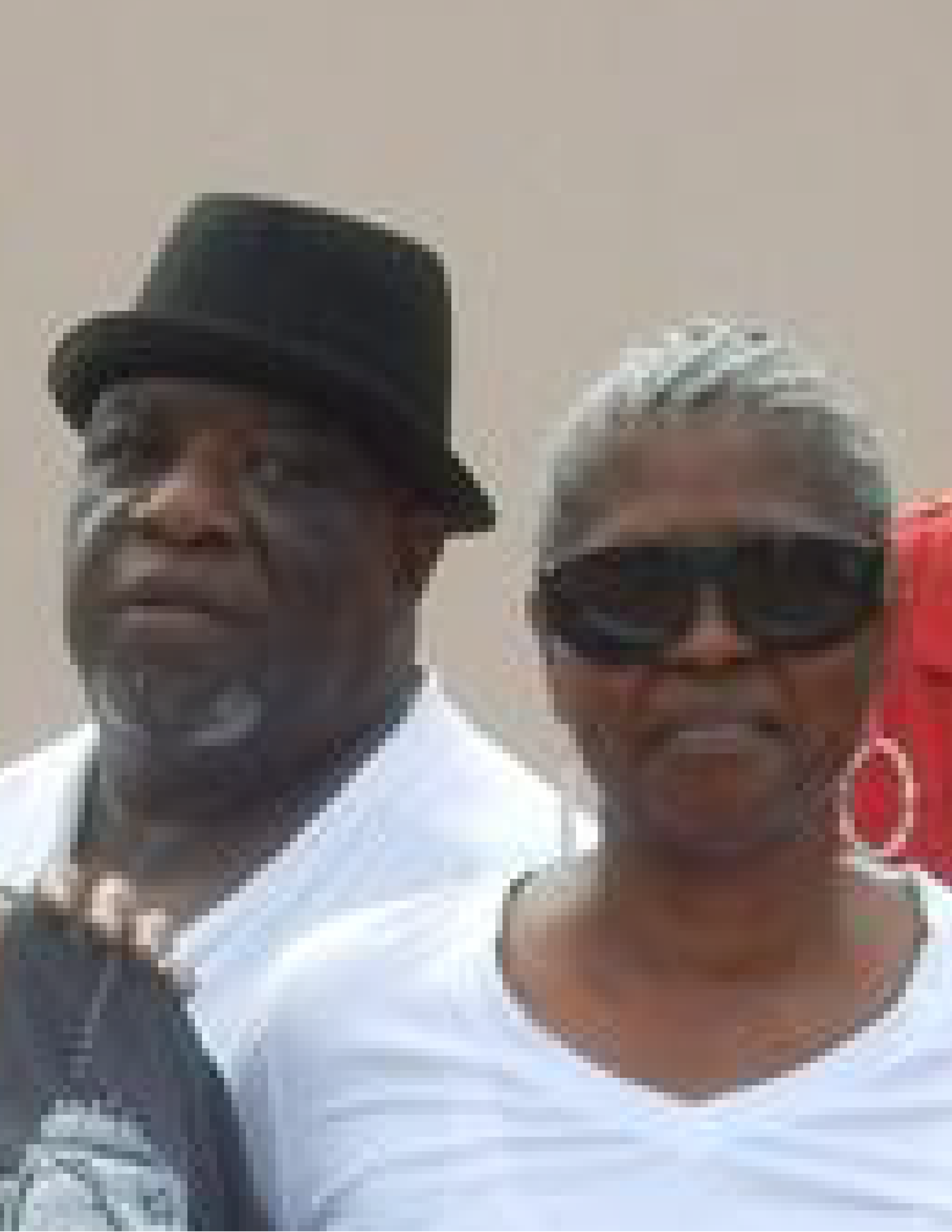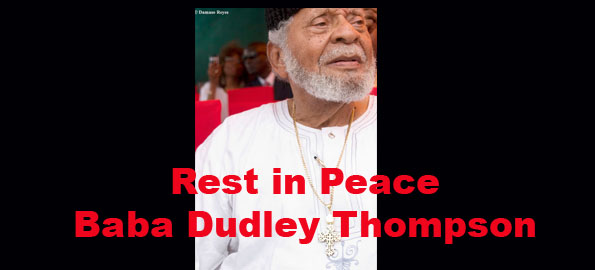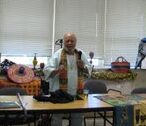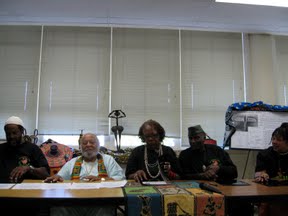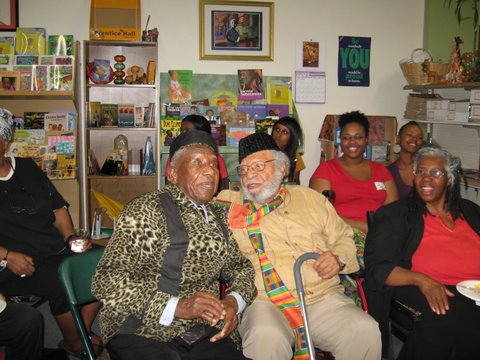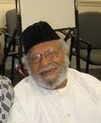by Bro. Cliff, SRDC Maryland Facilitator
On this page, we pay our respects to those members and leaders in SRDC and affiliated organizations who have passed on to the Honored Ancestors. Most of those mentioned on this page were Facilitators or members of the Councils of Elders in one of the states or localities of SRDC. On occasion, we will honor a close friend of SRDC, as in the case of The Honorable Baba Dudley Thompson, who was the President of the World African Diaspora Union (WADU) and a strong and honorable leader with a long history of service to Afrikan People who was working with SRDC International Facilitator Professor David Horne to build a closer working relationship between our two organizations. We also include a short slide show with photos (when available) of our Honored Ancestors at work.
Elder Adunni Oshupa Tabasi NuNu Afua Frie-Frie II
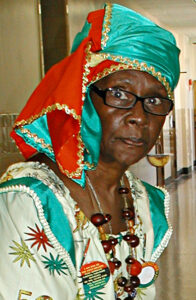 I met Elder Adunni Oshupa Tabasi NuNu Afua Frie-Frie II on January 7, 2007 at a Pan-Afrikan Town Hall Meeting at White Rock Baptist Church in Harlem, New York. That meeting was my official introduction to SRDC. Elder Adunni had organized, arranged and scheduled that Town Hall and also brought together a variety of local Pan-Afrikan activists, some I knew who were members of the New York Black Panther Collective, others who I had met on occasional trips to New York City, and members of SRDC who I had previously met at other Pan-Afrikan events.
I met Elder Adunni Oshupa Tabasi NuNu Afua Frie-Frie II on January 7, 2007 at a Pan-Afrikan Town Hall Meeting at White Rock Baptist Church in Harlem, New York. That meeting was my official introduction to SRDC. Elder Adunni had organized, arranged and scheduled that Town Hall and also brought together a variety of local Pan-Afrikan activists, some I knew who were members of the New York Black Panther Collective, others who I had met on occasional trips to New York City, and members of SRDC who I had previously met at other Pan-Afrikan events.
Two weeks after that Town Hall, there was a follow-up meeting where New York’s Diaspora Representative Team was nominated and elected, and Elder Adunni had asked me to come to New York for that event, but I was unable to make that trip. A few weeks after that, however, I did travel to New York to sit and speak with her at greater length. That interview became part of an Internet radio show I hosted at the time on Harambee Radio (http://harambeeradio.com).
The next time I would see Elder Adunni was at SRDC’s first Summit in September 2007 at Howard University. Unfortunately, that would also be the last time I would see her. I was fortunate to have the opportunity to meet her and gain the benefit of some of her vast wisdom, as evidenced by her chairing of the Ghana Nkwanta Project, her advocacy at the United Nations and her commitment to organizing the Pan-Afrikan Diaspora in New York to seek our voice in the African Union. I will miss her spirit and her wisdom, of which I was only able to sample a small taste. May her example inspire the rest of us to continue the struggle and to commit ourselves to the search for truth.
The following tribute to Elder Adunni was written by Adjoa Linda Fletcher, who took the reins of the Ghana Nkwanta Project upon Elder Adunni’s transition.
Remembering Our Beloved Elder Adunni Oshupa Tabasi NuNu Afua Frie-Frie II
http://nkwanta.tripod.com/id27.html
Elder Adunni was the Ghana-Nkwanta Projects’ driving force, motor, engine and all those that were close to her and worked with her know that Elder was always about US – Afrikan people doing the work that we need to do to create our future. A future in establishing self-sufficient communities. She knew deeply the predicament that our people are in and the depth of our psychological enslavement. Her efforts were full of energy, action and force. She believed deeply that we must go home to Mother Afrika or at least be a part of Afrika’s development and be a Pan-Afrikan people in building and not just in what she would call “hot air talking”.
Communicating with her was all about planning, vision and consistent work to reach goals and objectives. All of those that were fortunate to talk with her on a regular basis also know how deeply her commitment to her people is/was. She knew very well that most of us are asleep. Elder was never asleep at the wheel. I know it must have been difficult for her guiding us in our sluggishness. She had the energy of a lioness and was always ready and always planning. She taught many of us, how to just love the work that needed to be done – and to stay focused, stay focused.
Elder was very adamant in purpose and the freeing of our minds was her life goal and purpose. She knew quite well that we must see ourselves as Afrikans therefore we become connected to who we are and where we are from, and that we should not settle for being Blacks, Afrikan Americans, etc. She believed that when we use these terms we are in fact disconnecting ourselves from our history. Why settle for the daily degradations and disconnect ourselves from the fact that we were and are an enslaved people. She did not like for us to use the term ‘slaves’ that was seen as blasphemy to her and totally incorrect and destructive towards a view of self. We were ENSLAVED and still Enslaved and held Captive. She did not just say “Free the Land”; she knew that we must repatriate and free ourselves from this place of bondage.
Our Elder was also a creative genius in African attire and the lost art of clothing using draping techniques. She saw clothing ourselves as a liberating tool that we must use. Recently, I attended a couple of her workshops for the Afrikan Burial Ground’s Kwanza and she discussed the history of fashion, showing and teaching the women where the roots of fashion come from – from us Afrikans. Sophisticated dressing in draping and gowns came from us. She took two pieces of fabric and showed how two pieces of cloth could be arranged and rearranged into eight different ways to make a dress, tops, pants and skirts. It was a creative an awaking moment for us – releasing our creative potential and our history in creative dress. She said “this is what you do” when you do not have a sewing machine. Also, that it is enfranchising in being able to create your own clothes.
Elder was long on philosophy and understanding, but it all had a point, a direction directing us to take up the challenge for our liberation. She would instill in us that we are not to be tied to being Americans. She detested the restraints that this society places on us. The challenge is that we must extend our identity and to not settle for being this thing this product of America enslavement. We were not made in America and that we must dismiss this limited view of ourselves. These mental traps of enslavement, these disconnects to our reality. She use to say “Stop trying to make a better Jail”. Some times it was live having conscious Mama who had her switch out on you, always pointing out our confusion and our lack of trusts and our enslavement. Her goal was for us to pick up the mantel, the switch, whatever you got and make the moves to live your commitments daily. She brought us together, made us close, and would say “we got to be as so close that water cannot get through in our vision, efforts and beliefs. She preached that we have to understand our psychological enslave here and on the continent, and how it retards our ability to act and do what we got to do.
She was always giving us leads to probe, to dig, to dig to dig and then you know. It is about the education that we give ourselves a life of scholarship, action and involvement in which Elder Adunni practiced fully in Afrikan art, fashion, cuisine, history and her crowning joy of activism in regards to the Land Issue and developing the Land Gift in Ghana. She would say pick up the mantel of knowledge – we cannot have a movement of thought if we think it can only come from getting Ph.D. and credentials from this system that oppresses us. Another one of her favorite sayings was “we are out of our minds”. She knew that certain thought processes that we have got to change in order for us to be fully productive in our activities of activating change and shaping our lives. She would say learn to think, read, continue to find the truth, depth, your greatness, and build Afrika in the spirit of Pan Afrikanism.
Many of us are so fortunate to have had a mother in struggle. It was a privilege to walk beside her and to sometimes just listen and be of service. To talk with her and to work with her was a bonding experience. Sometimes to just sit next to her and hear her wisdom planted so deep from experience, as she would drop pearls, gold and diamonds of though and knowledge.
Elder would say “See What I See”! She would say “Stop being slaves to someone else’s ideals of so-called Democracy, a mental trick bag enslaving us and making us slaves to others. Her mission was and is to train us to think and act. We were not slaves but enslaved.
Elder Adunni had a view!
Sincerely,
Linda Fletcher
January 12, 2008
http://nkwanta.tripod.com
http://nkwanta.tripod.com/id8.html
http://nkwanta.tripod.com/id1.html
The February-March edition of KUUMBAReport Newsletter (http://kuumbareport.com/wp-content/uploads/2013/05/KuumbaReportPdf38Color.pdf) also included a tribute to Elder Adunni.
Baba Alfred L. “Fro” Ector
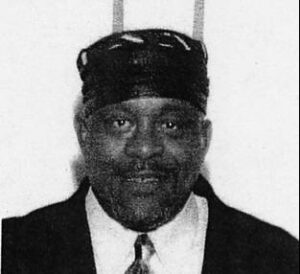 I never really got the chance to know Baba Alfred L. “Fro” Ector. At the SRDC Summit at Howard University in September 2007, I was still familiarizing myself with the different state organizations and the Facilitators, Representatives, Elders and other committee members who assembled that day. By the time of SRDC’s Summit in Columbus, Ohio, where we were able to meet members of the Ohio team more extensively, Baba “Fro” had already transitioned.
I never really got the chance to know Baba Alfred L. “Fro” Ector. At the SRDC Summit at Howard University in September 2007, I was still familiarizing myself with the different state organizations and the Facilitators, Representatives, Elders and other committee members who assembled that day. By the time of SRDC’s Summit in Columbus, Ohio, where we were able to meet members of the Ohio team more extensively, Baba “Fro” had already transitioned.
Following is a brief tribute to Baba “Fro” from the family, which appeared in the Dayton Daily News, Alfred Ector Obituary (2008) – Dayton Daily News (legacy.com):
Age 53, of Columbus, Ohio, formerly of Dayton, passed away unexpectedly, Sunday, February 17, 2008. Fro was educated in the Dayton School System, a graduate of International Broadcasting School, Sinclair Community College and the United States Air Force Academy. He was honorably discharged from the United States Air Force. He was employed at the Volunteers of America in Columbus and formerly employed at the VA Medical Center, Dayton and a former member of the Creekside Players Theatric Group. A member and instructor of Afrocentric Development Center. Fro was a fun loving person with a great deal of concern for his family and friends.
Baba Osondu Farr
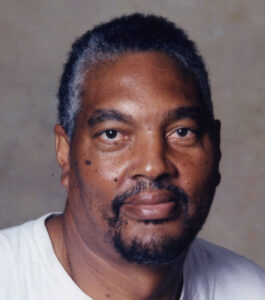 Baba Osondu Farr was another of the SRDC leaders who I never really got the chance to know. He had transitioned to the Ancestors in early September 2009, just before the SRDC Summit in his hometown of Seattle, Washington. He was present at the 2007 and 2008 Summits in Washington, DC and Columbus, Ohio, but the Seattle Summit in mid-September 2009 was when we all expected to get to know the strong activists from the Pacific Northwest better. Sadly, Baba Osondu passed on just before the Summit, leaving his wife, Mama Folashade Farr, to grieve and make arrangements for his homegoing services while the rest of the Seattle, Washington delegation carried on with the holding of the 2009 Summit. In Baba Osundu’s enduring memory, the Seattle delegation, which at the time consisted of Bro. T. West, Dr. Joye Hardiman, Sis, Marcia Arunga, Bro. Kamau Taplin and several other committed Pan-Afrikan activists and organizers, ran a successful and uplifting Summit, doing Baba Osondu and Mama Folashade proud.
Baba Osondu Farr was another of the SRDC leaders who I never really got the chance to know. He had transitioned to the Ancestors in early September 2009, just before the SRDC Summit in his hometown of Seattle, Washington. He was present at the 2007 and 2008 Summits in Washington, DC and Columbus, Ohio, but the Seattle Summit in mid-September 2009 was when we all expected to get to know the strong activists from the Pacific Northwest better. Sadly, Baba Osondu passed on just before the Summit, leaving his wife, Mama Folashade Farr, to grieve and make arrangements for his homegoing services while the rest of the Seattle, Washington delegation carried on with the holding of the 2009 Summit. In Baba Osundu’s enduring memory, the Seattle delegation, which at the time consisted of Bro. T. West, Dr. Joye Hardiman, Sis, Marcia Arunga, Bro. Kamau Taplin and several other committed Pan-Afrikan activists and organizers, ran a successful and uplifting Summit, doing Baba Osondu and Mama Folashade proud.
Baba Osondu’s Memorial Celebration would be held on September 17, 2009. As a sign of his enduring legacy, his and Mama Folashade’s son Jamal would continue to contribute to the ongoing effort to organize the Diaspora, and their grandson Shug would participate in marches and protest actions on behalf of George Floyd and other victims of police brutality, proudly rocking a T-shirt bearing Baba Osondu’s likeness.
Dr. Edialeda Salgado do Nascimiento
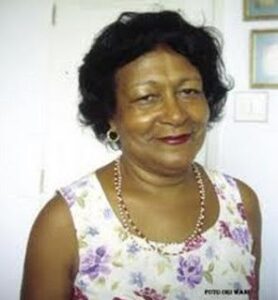 The SRDC Web site had included a brief tribute to “Dr. Edialeda” as we knew her. Her fluency in Portuguese and English, as well as several other languages, and her extensive history in medicine and in fighting for the rights of her people, made her a valuable leader and ally in our struggle to lift up the Pan-Afrikan Diaspora. We lost her to the Honored Ancestors in 2010, before we could truly mobilize on behalf of Afrikan people in her home country of Brazil.
The SRDC Web site had included a brief tribute to “Dr. Edialeda” as we knew her. Her fluency in Portuguese and English, as well as several other languages, and her extensive history in medicine and in fighting for the rights of her people, made her a valuable leader and ally in our struggle to lift up the Pan-Afrikan Diaspora. We lost her to the Honored Ancestors in 2010, before we could truly mobilize on behalf of Afrikan people in her home country of Brazil.
Dr. Edialeda Salgado do Nascimiento | SRDC International
srdcinternational.org/?p=984
Jan 30, 2011 · A TRIBUTE to the LIFE of DR. EDIALEDA SALGADO do NASCIMIENTO. Comrades historical Secretariat of the Black Movement and militants of the Democratic Labor Party (PDT) are mobilized to honoring Dr. Edialeda Salgado’s life in the period from January 31 to February 15, 2011.
The Web site Black Brazil Today published an extensive biography of Dr. Edialeda Salgado do Nascimiento, In memoriam: Edialeda Salgado do Nascimento, speaker of five languages and first black woman to be named a Secretary of State in Brazil, on her amazing career, being a black woman and black history (https://blackbraziltoday.com/in-memoriam-edialeda-salgado-do-nascimento-speaker-of-five-languages/), by Marques Travea, Black News From Brazil, December 22, 2012, a portion of which we include here:
In memory, these are the words of the late Edialeda Salgado do Nascimento (1941-2010), the first black woman to assume a position of Secretary of State of Brazil.
“To be a black woman in this country that says that racism doesn’t exist is complicated. But it is not more complicated than you accepting yourself and loving yourself as you are. Looking at yourself in the mirror and saying: How beautiful I am, how intelligent I am and how capable I am. Each one has to feel that they are. Then, everyone is intelligent, beautiful and capable.
“It has to be you that chooses, knows and thinks of yourself as a woman and black. I fight for our class of women, for our race of black people and I fight for the Brazilian people. My name is Edialeda Salgado do Nascimento. I am a doctor and a militant of the Movimento Negro.”
Below is a bit of Edialeda’s story as told to Eparrei, a black woman’s magazine
The year was 1967. An influential friend went to a renowned university to request a scholarship for Edialeda Salgado do Nascimento from the director. Instead, knowing that he was dealing with a black woman with four children, he offered a job as a cook in his house.
Instead of becoming discouraged, Edialeda faced the fact as a challenge.
“I was not his cook, I spoke five languages, I speak Portuguese, I speak and write Spanish, Italian, French and English well, a little of German, meaning, I didn’t go where it was they thought was my place.”
In March of 1983, at the invite of Lionel Brizola (1), she assumed the position of State Secretary of Social Promotion. Even occupying this important position, it was not the end of racial discrimination. In the day it was announced that she would assume this post, the doorman barred her saying that he could not let her pass because there only Secretaries of State could enter. When he discovered that Edialeda was the new Secretary of Social promotion, embarrassed, he allowed her to enter.
“For them, a black woman could never be Secretary, even more so in the 80s.”
Edialeda is the type of woman that likes to tell her stories in her agitated and quick manner of speaking. Since childhood, she kept good memories, but like the majority of black children she felt the first impact of racism in school. When she completed assignments for her colleagues she was considered a morena (2), but this was a term that didn’t please her thus she affirmed her identity as black.
For the full article, please visit https://blackbraziltoday.com/in-memoriam-edialeda-salgado-do-nascimento-speaker-of-five-languages/.
Baba Dudley Thompson
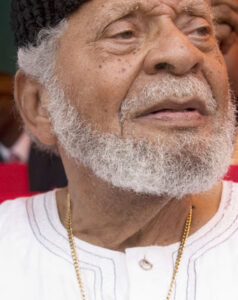 By the time I met Baba Dudley Thompson, he was already a legend, but I did not know this. Wikipedia (https://en.wikipedia.org/wiki/Dudley_Thompson) devotes much of its biography to his time as a younger Pan-Afrikan lawyer and activist and his time in Jamaica’s government.
By the time I met Baba Dudley Thompson, he was already a legend, but I did not know this. Wikipedia (https://en.wikipedia.org/wiki/Dudley_Thompson) devotes much of its biography to his time as a younger Pan-Afrikan lawyer and activist and his time in Jamaica’s government.
From his university days he was a close associate of pan-Africanists such as Kwame Nkrumah, George Padmore and C. L. R. James. After qualifying as a barrister at Gray’s Inn in the early 1950s, and doing tutelage with Dingle Foot, QC, Thompson went on to practise law in Africa – in Tanganyika and Kenya, where he became involved in the nationalist movements. He assembled the international legal team that defended Jomo Kenyatta in his trial after he had been seized by the British colonialists in 1952 and subsequently charged with treason, accused of being an instigator of the Mau Mau rebellion. Later as President of Kenya, Kenyatta memorably placed his hand on Thompson sitting beside him and said: “This man saved my life.”[5] In Tanzania, where he was a friend of Julius Nyerere, Thompson is remembered as a founder of the Tanganyika African National Union (TANU).
In 1955 he returned to Jamaica,[2] and continued to educate people about furthering the links between Africa and the Caribbean, visiting schools to deliver inspirational addresses about the continent (Jamaica-born writer Lindsay Barrett was inspired to decide to live in Africa by one such visit that Thompson paid to his school, Clarendon College, in 1957).[6] He practised law in Trinidad, Barbados, St. Kitts, Dominica, Bermuda, Grenada, The Bahamas, Belize and elsewhere in the West Indies, playing a role in the independence movements of both Belize and the Bahamas.[7] He was appointed a Queen’s Counsel in 1963.
I did not know these things about him when I met him, but his stature and importance shone through nonetheless.
April 4, 2008. I had driven to New York City for a meeting between members of SRDC’s Secretariat and leaders of the World African Diaspora Union (WADU), one of the strong Pan-Afrikan organizations that had established itself in the United States and the Caribbean. About a year before, WADU had elected “Baba Dudley”, as many of us affectionately knew him, as their President, with Dr. Leonard Jeffries as Vice President. That these two towering figures were in WADU’s leadership was a strong testament to WADU’s importance and relevance to the Pan-Afrikan struggle.
I was fortunate enough to sit next to Baba Dudley for part of this meeting, and this gave me the opportunity to experience his moral force and his personal charisma up close. He and SRDC’s International Facilitator, Professor David Horne, were good friends, and it was easy to see why. This meeting was to lay the groundwork for what was hoped to become a partnership between SRDC and WADU as we continued in our slightly different but complementary missions on behalf of the Pan-Afrikan Diaspora.
I would see Baba Dudley again at WADU’s Summit in Atlanta, Georgia in July 2009, and yet again at SRDC’s Summit in Seattle, Washington that September. He and Dr. Jeffries regaled us all with stories and analyses about the Pan-Afrikan struggle during that 2009 Summit.
I would see him once more, in a conference where he made a video call to a December 2011 Diaspora conference just outside of Washington, DC. This was just over a month before he would join the Honored Ancestors on January 20, 2012, one day after his 95th Earth Day.
As I was reading the first reports of his passing, I came across an anecdote that had me doubled over in laughter, for it captured his irrepressible wit and his somewhat-irreverent sense of humor. Long ago, when he was a barrister in the court, his opposing counsel had just finished a two-hour opening statement. The judge asked him whether he wanted to make his statement immediately afterward of if the court could take a short break. Baba Dudley’s answer: “Your Honor, I will speak now, but this won’t take long. For, like my esteemed opponent, I too have nothing to say.”
Baba Dudley, you lived a long and productive life of which anyone would be proud, but we are selfish, and we would have wanted to keep you with us, even if just a little bit longer.
Wikipedia has a concise article about his storied career (https://en.wikipedia.org/wiki/Dudley_Thompson).
Mama Folashade Farr
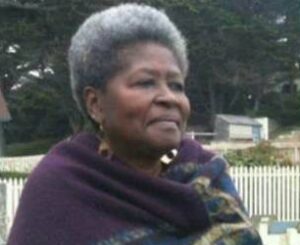 We first heard that Mama Folashade Farr was waging serious health battles back in 2013, one year after we had seen her at the 2012 SRDC Summit in Nashville, Tennessee. She had not spoken publicly about her battle, but several of us were concerned about her even then. It was not until July 12, 2017 that Mama Folashade would join her late husband, Baba Osondu, in the Realm of the Honored Ancestors.
We first heard that Mama Folashade Farr was waging serious health battles back in 2013, one year after we had seen her at the 2012 SRDC Summit in Nashville, Tennessee. She had not spoken publicly about her battle, but several of us were concerned about her even then. It was not until July 12, 2017 that Mama Folashade would join her late husband, Baba Osondu, in the Realm of the Honored Ancestors.
Mama Folashade was the Washington State Facilitator, and as such, she organized the local group’s activities with exceeding thoroughness, professionalism and grace. And when she called upon other members of the SRDC Secretariat to produce a document, craft a presentation or schedule a meeting, she got results because of the strength of her character. She expected results and she got them. The strength she exuded was exemplified in the fact that she made sure that the 2009 Summit in Seattle went on as scheduled even as she was mourning the loss of her beloved husband. We did not see her that weekend at the Summit, but we all knew her spirit, and that of Baba Osondu, were there.
The members of the Washington State organization benefited greatly from her leadership and we all miss her spirit an the power of her example every day.
This brief obituary appeared on the Web site https://www.echovita.com/us/obituaries/wa/seattle/corinne-folashade-farr-4676651:
It is always difficult saying goodbye to someone we love and cherish. Family and friends must say goodbye to their beloved Corinne Folashade Farr (Seattle, Washington), born in Natchitoches, Louisiana, who passed away at the age of 68, on July 12, 2017.
Mama Maisha Washington
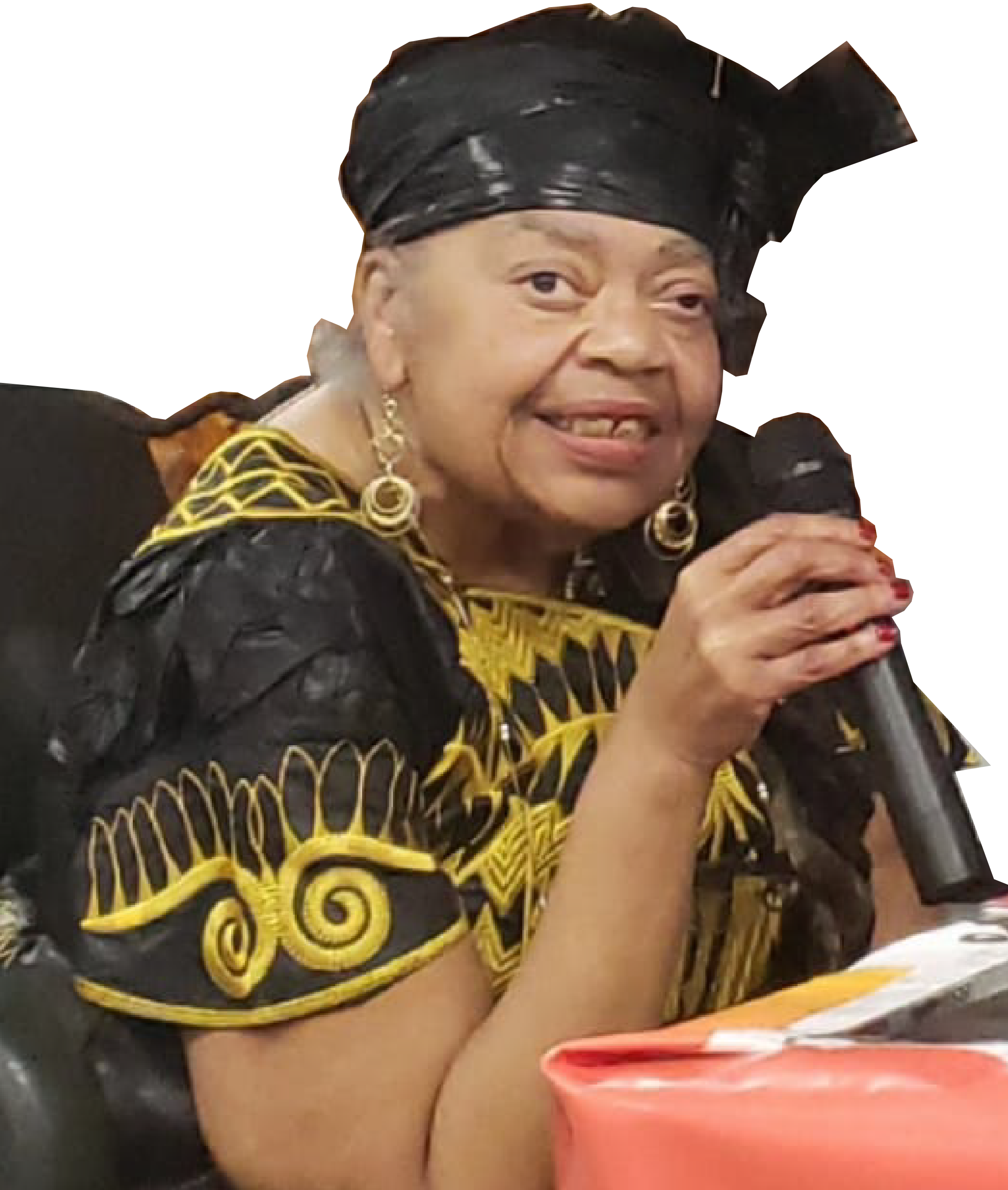 (Excerpts from the post The Ancestors’ Call: Mama Maisha Washington, Maryland Council of Elders, Sixth Region Diaspora Caucus on this site and on KUUMBAReport Online, https://kuumbareport.com)
(Excerpts from the post The Ancestors’ Call: Mama Maisha Washington, Maryland Council of Elders, Sixth Region Diaspora Caucus on this site and on KUUMBAReport Online, https://kuumbareport.com)
Mama Maisha Washington (transitioned October 20, 2020) was first and foremost a teacher. She taught regularly in the Baltimore City Schools, imparting her knowledge as well as her love for and commitment to the uplift of Afrikan People to her students, teaching them to be proud of their heritage and of what they would become with a thorough and conscientious education. Her Pan-Afrikan activism was always imbued with her commitment to showing us all what we could accomplish with a commitment to excellence as well as to truth, justice and righteousness.
Mama Maisha had been a longtime member of the All-Afrikan People’s Revolutionary Party (A-APRP) dating back to the time of Ancestor Kwame Ture, and maintained her ties to that great organization to the end. More recently, she was an Elected Representative from Maryland in the Sixth Region Diaspora Caucus (SRDC) in 2007, and became a member of the Maryland Council of Elders (MCOE) when it was established in December 2017. Mama Maisha was a prominent presence at the 2018 SRDC Summit in Baltimore, Maryland and the 2019 SRDC Summit in Charleston, South Carolina.
Over the last year, she was involved in preliminary discussions with engineers, architects and project managers for the building of what will be the first Public Library in Liberia’s history. Her most recent achievement was her leadership, in cooperation with the Liberian activist organization Sehwah-Liberia, of the 2020 Pan-African Virtual Summer Camp, which was held during the months of July and August of this year and brought over 40 students from Liberia and from the Baltimore, Maryland area together in a series of virtual classes in subjects from Project Management, Environment and Computers to Linguistics, Oral History and Yoga. The Summer Camp was a tremendous success, and plans were being made to launch a second Summer Camp in 2021 and, possibly, the establishment of a similar year-round virtual learning project.
Memorial Ceremony
Mama Maisha will be sorely missed and mourned by her immediate family, by her colleagues in the Maryland Council of Elders, by her colleagues in SRDC, in particular the Maryland Organization, by her comrades in the All-Afrikan People’s Revolutionary Party and the All-African Women’s Revolutionary Union, by the many committed activists in the other Pan-Afrikan organizations with whom she worked and interacted, by her co-workers and friends in the Baltimore City Schools, and also by the many students she taught regularly in Maryland and the young people in Liberia who, in the short time they knew her, quickly came to love her for the enthusiasm she inspired in them for learning and the love and care she showed to them all.
Rest In Power, Mama Maisha. We know the Creator and the Ancestors are pleased with your work and have a Place of Honor reserved for you. We only pray we will ourselves live up to your example and earn the right to join you one day in Eternal Paradise.
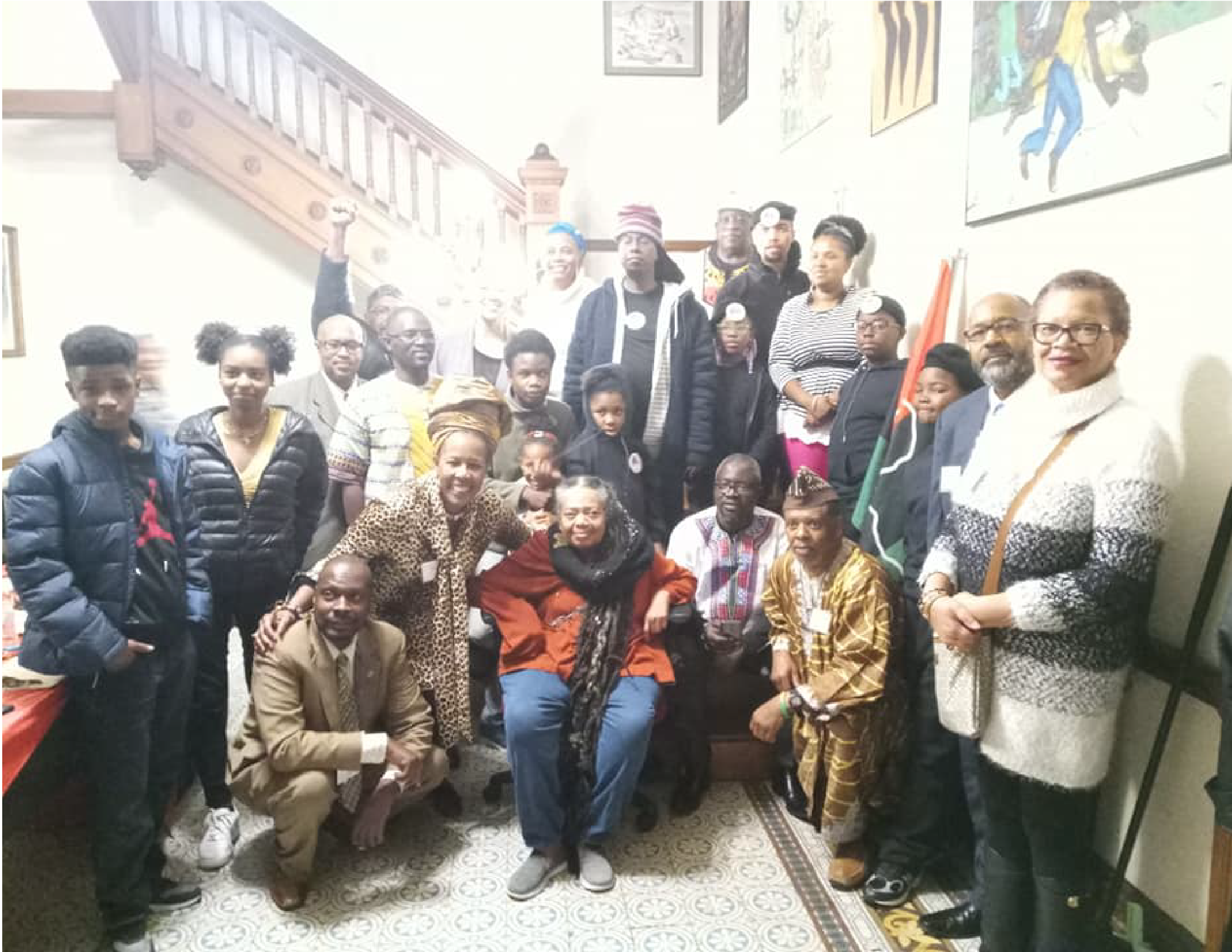
Mama Maisha (center) in the lobby of the Great Blacks In Wax Museum with attendees at the 2018 SRDC Summit in Baltimore, Maryland.
Elder Nabeela Uqdah
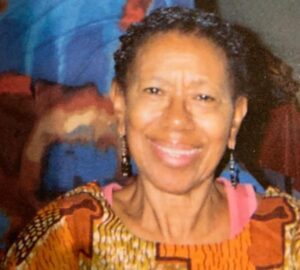 Elder Nabeela Uqdah, longtime Pan-Afrikan activist and mother of former SRDC New York Facilitator Sis. Iman Hameen, transitioned to the Honored Ancestors on January 4, 2021. Bro. Cliff had the honor of meeting with her at length when he visited her and Sis. Iman in Connecticut in 2012, and then saw them again in November 2017 when they attended an event at the African Union Mission and delivered a profound statement for the African Union Commission Chair, the Honorable Moussa Faki Mahamat, during a public Town Hall Meeting sponsored by the African Union. Both encounters demonstrated the intellect and fierce commitment to Afrikan people of both Sis, Iman and Mama Nabeela.
Elder Nabeela Uqdah, longtime Pan-Afrikan activist and mother of former SRDC New York Facilitator Sis. Iman Hameen, transitioned to the Honored Ancestors on January 4, 2021. Bro. Cliff had the honor of meeting with her at length when he visited her and Sis. Iman in Connecticut in 2012, and then saw them again in November 2017 when they attended an event at the African Union Mission and delivered a profound statement for the African Union Commission Chair, the Honorable Moussa Faki Mahamat, during a public Town Hall Meeting sponsored by the African Union. Both encounters demonstrated the intellect and fierce commitment to Afrikan people of both Sis, Iman and Mama Nabeela.
Below is a biography and obituary for Mama Nabeela, written by Sis. Iman and her other children. We will miss her wisdom and the family will miss her devotion and compassion, but we know her fire will live on in those who loved her and learned from her.
Obituary: Elder Nabeela Uqdah
Elder Nabeela Uqdah, formerly Betty Rice Roper and Sis. Betty R. X, resident of New Haven, Connecticut, transitioned in her Munson Street home on January 4, 2021 at approximately 5:30am at age 89. She was surrounded by her loving, immediate family with songs from one of her favorite Jazz vocalists, the late Irene Reid, playing in the background. After suffering a stroke in October 2019, dementia gravely and tenaciously altered her life, causing her demise. She was born on January 26, 1931. Her ashes will be scattered in Africa, as she requested.
Childhood
Nabeela was a precocious child and “the baby of the family” being the youngest of eight children. She was predeceased by all her siblings – Catherine R. Arnold, Marion, Dewey (who died of crib death at 3 months), Elsie R. Hoff, Bernard, Marjorie R. Lewis, Elizabeth R. Carter and her parents, Isaac Bronson Rice and Hazel Mae Bush Rice, both of Ohio, nephews Curtis Carter, Jr. and Richard Arnold of New Haven’s own,” The Five Satins” and niece, Gwendolyn “Jay” Hoff.
In her early years in her hometown of Middletown, OH, she was the leader of her neighborhood. She was extremely popular. Her friends would fight over who would hold her hand when they walked down the street. She exhibited strong qualities of leadership, uniqueness, sensitivity and a thirst for education, always asking “why” and “why not” to understand life’s complexities.
Family History
Her life in Middletown was centered around a close knit, low income black community, surrounded by role models, nuclear black families, schools that prepared all children for lifelong high paying careers and plenty of opportunity for development. Unfortunately, due to migration and the promise of jobs in the North, like many other “negro” families, her father Isaac moved his family East, for better financial opportunities.
Connecticut and Stony Creek (Branford) in particular, were sharp, cruel contrasts to her former environment. She was thrown into a world of rich upper class whites, where blacks were few and far between, her Dad, who spoke fluent Greek, worked for rich families in Stony Creek and Pine Orchard as their butler, landscaper, gardener and the like, on a servant’s salary that promised to pay more but never did. The move was a miserable one for the entire Rice family. They yearned for the social life they left in Ohio and found it when they joined Bethel A.M.E. Church on Sperry Street in New Haven, where they swiftly adjusted. They found their new home there.
Nabeela, the more revolutionary one, observing the luxuries attained by whites, and the lack that blacks lived with, concluded early on that the lives of a black man and a white man are seriously and intentionally different. She spent the rest of her life delving into “how” and “why”.
Marriage/Children
She married the late James Roper Sr. and cared for her two children, Reid and Robin, keeping them meticulously dressed, coiffed and raised with perfect manners. Everyone remarked at how well behaved her children always were. She was an exceptional mother who taught them every lesson she learned in life. On the subject of death, she taught them that death is the last rite of passage in the physical realm.
Employment/Education
Like her older sisters, Mama Nabeela was a skilled seamstress. She worked at Schwartz Shirt factory but wanted more. Being a wanderlust, she walked into an airline human resources office to apply for a job as a flight attendant. This was in the early 1950’s. She was told that “no colored” were allowed. Dejected and seldom taking “no” for an answer, she did an about-face and applied for a community nursing program at Yale-Grace New Haven Hospital. She was accepted and graduated with high honors. She exemplified strong qualities of leadership, uniqueness and a thirst for education, always asking “why” and “why not” to understand life’s complexities.
Personal Development
Still seeking, Mama Nabeela, now a certified LPN, became a dedicated, devout member and pioneer of the Nation of Islam (Temple #40) and the Hon. Warith Deen Muhammad community for decades. She made pilgrimage to Mecca (Hajj) in 1978, earning the distinguished title of “Hajjah”, one of the first in the Islamic African American, New Haven community to do so. Feeling a need for change, she moved to Westchester County in NY. She helped found a masjid in Yonkers, NY, started a food co-op for the Bronx Woodycrest Avenue Masjid to implement “do for self”, Ujima – collective work and responsibility, and Ujamaa – cooperative economics, and conducted a large scale health fair with herbalists, medical doctors, dentists, physical trainers and alternative medicine practitioners.
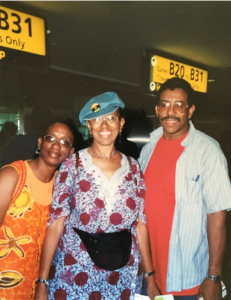
Mama Nabeela departing for Ghana in 2001, pictured here with her children.
Elder Uqdah later gravitated to the Pan African community and made a lifelong commitment to return to Mother Africa. She traveled to at least 10 African countries and made the decision to permanently repatriate there. At 70 years of age, she packed up all her belongings and life savings to reside in Namibia, Southern Africa and lastly, Ghana, West Africa for at least 13 years. She returned to the US in 2012 for much needed hip surgery and quickly returned to Ghana after recovering, only to return to the US again, in 2014, for a second hip surgery. She aspired to move to Tanzania upon recovering but never returned to the continent of Africa, again. Note: Keep in mind that she did not leave on a whim. She researched each country’s culture, climate, language, people and political history thoroughly for at least 5 years. She travelled to Jamaica on a group trip with Dr. Rahsaan of Sundial Products and visited a Maroon community to learn their ancient history and practices in farming and nutrition. She also lived on a black owned farm in South Carolina, co-run by the family of Nicholas “Ashanti” Bartlett, offering to work on their farm for a full summer so that she could know better how to work the land in Ghana. The families remained lifelong friends.
Community Work
Elder Nabeela was on various committees and was a member of numerous organizations, even starting one of her own, “Sankofa Penny-A-Day”, after hearing about the concept on a WLIB-NY radio program. Her efforts helped raise over $3,000 by saving pennies in the course of one year, all of which were donated to Marcus Garvey Park in Harlem, NY. She remained a nationalist and Pan African, always searching for truth, justice and correctness. She lived her life in service to others and worked vehemently to lay the foundation for Reparations for black people which helped to make it the household word that it has become today.
Her commitment to fight injustice, led her to action. She was on the frontline of many demonstrations and protests covering a full range of issues from adequate medical care and saving Sydenham Hospital, establishing a 3rd political party before it was fashionable to ask for one, United Nations protests for the end of apartheid, lifting sanctions against Zimbabwe, freeing Nelson Mandela, Reparations/Repatriation, better public education, a demand for Dr. Adelaide Sanford to be chosen as the 1st black NYC Board of Education Superintendent of Schools, freedom for political prisoners, police brutality, the murders and abuse of innocent blacks – Michael Griffith, Yusef Hawkins, Nicholas “Ashanti” Bartlett, Eleanor Bumpers, Yvonne Smallwood, and the Central Park Five – known today as the Exonerated Five, to name the most heinous. She marched arm-in-arm with 1,000 other warriors at the infamous December 12th Movement’s “Day of Outrage” protest shutting down the Brooklyn Bridge.
Attending every weekly lecture at First World Alliance in Harlem, an esteemed African centered lecture series that was the premiere study group and citadel for learning African history from the top scholars of our time, she became a faithful member of the United African Movement organization and its Sisters Security Committee, founded by Atty. Alton Maddox, attended regular lectures there, as well, to learn the philosophies of noted guest speakers, and co-produced her own public access cable TV show entitled, “In My Opinion” with a format designed to probe solutions and theories with guests who lived their lives as organizers and problem solvers. Elder Uqdah was among the Sharpton 15 who were jailed without protocol, for 15 days, for protesting the cover-up of the rape and kidnapping of then teenager, Tawana Brawley.
When organizing for Reparations was considered pointless, she formed a committee that walked the streets of Harlem, Queens and Brooklyn, every day for a few years, distributing informational flyers about what Reparations is and how to obtain it, accompanied by an information sheet about Willie Lynch. Until that time, the general public vaguely heard of Reparations, nor cared to, and few had heard the name “Willie Lynch”.
Recognizing a need to educate the public further about Reparations, Nabeela organized a major conference, with workshops and guest speakers, the main speaker being Dr. Robert Brock, to dissect Reparations laws and requirements. Dr. Brock is the lawyer and Reparations expert who filed for Reparations at the 11th hour on behalf of the black community eliminating the statue of limitations and making it possible for all Reparations cases to be heard in any court. Today, both Reparations and Willie Lynch are on the lips of politicians, news anchors in the mass media and everyday folk. Mother Uqdah was a woman and warrior of conviction, dedication, nobility and integrity.
Friendships
Throughout her life, she befriended people from all walks of life. Always looking for serious minded people who practiced what they preached, she had no qualms about approaching anyone, from celebrities and Heads of State to ordinary people alike, challenging something she took exception to or needed them to explain, hoping to find like-minded people like herself. In 2019, New Haven (CT) Mayor Toni Harp presented her with a Mayoral Proclamation for her community work and her work for the demand for Reparations at the annual Juneteenth celebration on the New Haven Green.
Elder Nabeela had a straightforwardness about her that helped her command audiences with anyone she desired to speak with. She met with African presidents, chiefs, kings, and politicians, regularly holding court with the likes of the Mayor of Durban, South Africa and Chokwe Lumumba, Mayor of Jackson, Mississippi, activists and celebrities like Kwame Touré (Stokely Carmichael), Danny Glover and Rev. Al Sharpton, who always seemed to spot her in a crowd with ease, Sister Souljah, Serena Williams, Dr. Jewell Pookrum, Dr. Sebi, and Min. Abdul-Hafeez Muhammad, to historians and brilliant scholars such as Drs. Ben Jochannan, John Henrik Clarke, Na’im Akbar, Marimba Dona Ani and Baba James Small to name a few. She confidently explained that,” I can get anybody to do what I want.”
Later Years
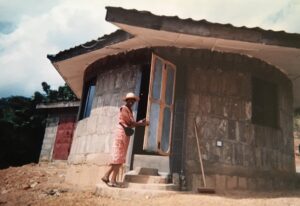
Mama Nabeela at her home in Akosombo, Ghana.
The “bucket list” was her way of life. From entering college in her fifties, to scuba diving in Tanzania, to sailing along the Nile, to driving up the narrow roads of Mount Washington in New Hampshire, to entering the Door of No Return in the Ghanaian slave dungeons more than once, to walking through the mighty complex of the Pyramids of Kemet (Egypt), to clearing an acre of forest growth to build her own chalet and private house in the Eastern Region of Ghana, to volunteering her nursing skills in a burn unit at Korlebu Hospital in Accra, Ghana, she followed her passions and beliefs, living her life the way she saw fit, well into her late 70’s. She fulfilled her dream of writing her first book, “The Unfailing Guide” that contains her definitions for words and meanings that others take for granted.
Sis. Uqdah was employed at the Jewish Home for the Aged, Yale New Haven Hospital, and Veteran’s Hospital of West Haven. Before retiring at age 62, she shifted to private duty nursing and private practices in mid – Manhattan, Pelham, Dyre Avenue and City Island in the Bronx, and Upper Westchester NY. She was a Harlem resident when she retired.
Descendants
Sis. Uqdah was also predeceased by her only son, Reid Dirk Roper (wife Shirley) of Killingworth, CT. Her beloved son who was so much like her, died from COVID-19 after a short hospital stay, exactly one week before she expired. She is cherished and survived by her daughter, Iman T. Uqdah Hameen (aka Robin), her son-in-law, Jesse “Cheese” H. (Kilpatrick) Hameen ll, and grandchildren, Najeeb (wife Erica) of NY and Pittsburgh, Hanan of NY and CT, Jesse Hameen lll, step-grandchild Ameen (William Hatcher) Hameen and great grandchildren Khalil, Idris, Jionn, Amyrhzell, “Little One”, Adeyemi Elam, William Johnny Kilpatrick and the offspring of Reid and Shirley – Charlise (her oldest grandchild) and Reid Jr. and Charlise’s children – the Panzeras (Nicholas, Jasper, Alexander, Ariana and John), numerous devoted nieces, nephews cousins and close local, national and international friends who make up her extended family.
Actualization
Elder Nabeela H. Uqdah fought the good fight. She lived the essence of Christianity, Islam, African Spirituality and the “Nguzo Saba”, the 7 principles of Kwanzaa, every day. The world is a better place because she was in it.
Her family extends a heartfelt “Thank You” for gracing her life. Your prayers, words of support, time, thoughtfulness, generous gifts, cards and moments of reflection are a comfort to us and a testament to her. She loved you all. She honored and thanked the Most High “Omnipotent Intelligence” for her life and every aspect of it every day. She rests in Truth and Power.
“It is so! It is done!”
A Virtual Remembrance was held on Jan. 26, 2021 at 6 pm EST via Zoom on what would have been her 90th birth anniversary, hosted by her grandchildren.
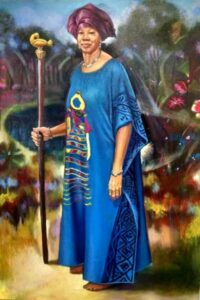
Mama Nabeela Uqdahs Portait by Pheoris Webb.
Baba Oscar Brathwaite
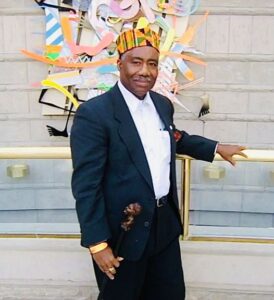 On Monday, May 8, 2023, we learned of the passing to the Honored Ancestors of our dear Elder and comrade, Baba Oscar Brathwaite of Toronto, Canada. Baba Oscar had been fighting a number of health issues that had limited his activities over the last few years, but we were nonetheless shocked to learn of his passing.
On Monday, May 8, 2023, we learned of the passing to the Honored Ancestors of our dear Elder and comrade, Baba Oscar Brathwaite of Toronto, Canada. Baba Oscar had been fighting a number of health issues that had limited his activities over the last few years, but we were nonetheless shocked to learn of his passing.
Baba Oscar was known as a consummate educator, dedicated to the restoration and promotion of Afrikan-centered educational institutions, principles and practices. We will share more information on Baba Oscar in the near future.
His family writes on Facebook:
We are very sad to share that our father E. Oscar Brathwaite has passed on. Though we, and so many others, will miss him dearly, we are thankful for his life, love and all of his contributions both here and abroad. We celebrate him through good memories and recognition of his vision and his legacy. He is now with our ancestors and the Creator, and for that we are grateful.
Dr. Barryl Biekman of the African Union African Diaspora Sixth Region Facilitators’ Working Group and Tiye International in The Netherlands, writes in tribute:
May his soul rest in Peace & Power.
For those who do not know. Oscar is well known as one of our pioneers of PASEN on the development of African Centered Education methodology; active family member of the AUADS 6th Region developments; A Canadian authentic Pan Africanist; Human Rights Activist. Leader of the Canadian HR clinic and deeply involved in the Durban Declaration and Programme of Action (DDPA) mission on the aspect of Reparatory Justice.
My heart cries Oscar but I’m happy too knowing too that you are now in good everlasting company with the Ancestors on whose shoulders you lived.
I’m thankful that i have learned much from you as my Grand Master Teacher, Elder on how to become a real dedicated passionate Pan Africanist.
I remember the lessons from you and Dr Khazriel about the difference between education and dedication. Like Dr. Tumenta and Professor Horne about the difference between PHD & PH-Do.
A big Applause for you Oscar
You won’t be dead until we’ve forgotten you. (And we shall not forget.)
Sister Barryl Biekman
